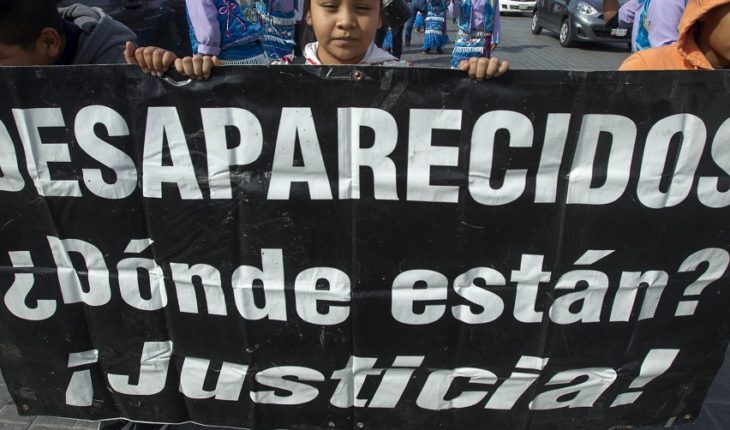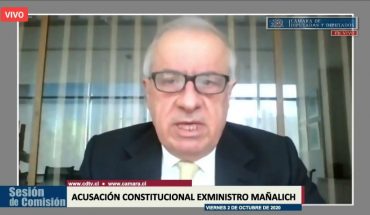Mexico signed in 2007 the International Convention for the protection of all persons from enforced disappearance (of the UN), however, the authorities National have refused since then to accept that the Committee which oversees the implementation of this system can analyze specific cases of disappearance that occurred in the country.
It is, therefore a barrier that prevents the Mexican victims access to the international framework of protection, barrier that a 68-year-old woman, mother of three young men disappeared, intends to demolish. Her name is Maria Herrera Magdaleno, founder of the movement for peace, of the network of national links, and collective families in search.
As established in article 30 of the Convention for the protection of all persons from enforced disappearance, the Committee of experts responsible for ensuring their implementation has among its powers the consideration “urgently” those allegations of disappearance, making them to reach relatives or persons with a legitimate interest, with the aim that this international body issue “recommendations to the State party”, as well as “precautionary measures to locate and protect” the victim.
In addition, once the Committee take on the matter, the Convention ordered that “will continue its efforts to collaborate with the State party, while the fate of the disappeared person have not been missing”.
However, in Mexico it does since, so that the Committee of experts of the United Nations to intervene in specific cases, each country must before expressly accept the jurisdiction of this Committee – something that the Mexican Government has refused to do, even when the UN is the He has asked.
Against this omission of the Mexican authorities (that has raged for more than 10 years), the past 3 March 2018, the – originally from Michoacán, and mother of three missing young – lady María Herrera, decided to undertake a legal battle to force the State Mexican to admit the intervention of the UN Committee on enforced disappearances in specific cases.
Raul and Salvador, two of the sons of the Lady María Herrera, disappeared in 2008 in Atoyac de Alvarez, Guerrero, where were for the purchase of gold pods to make handmade jewelry. Both arrived in Atoyac, along with five colleagues, hours after an operation against organized crime groups security forces will be developed in the area. Raul was 19 years old, and Salvador 24, at the time of his disappearance.
Two years later, in 2010, Luis Armando, also son of María Herrera, disappeared along with two other relatives, then they mark them high at a military roadblock in Veracruz.
In the demand of amparo filed by the Madam María Herrera, this makes a detailed account of the preliminary investigations initiated by the authorities “without any result”, and the struggle to find their children through the movement for peace, of the network of links National and collective thereof that she heads, relatives in search.
“From this experience – detailed-, we have found that, given the inadequacy of national guarantees of human rights, in the crisis of impunity that lives our country become fundamental international guarantees (…) “We have verified that only through the Strait and continuous monitoring international will generate the required pressure for that missing imported him to the federal Government, and so are hunted.”
Therefore, underlined in the demand for protection, it is essential that the Committee of United Nations against enforced disappearance can intervene with concrete cases in Mexico.
Should be noted that, from the year 2016, the United Nations requested “strongly to the State party (Mexico) to recognize the competence of the Committee to receive and consider” allegations of enforced disappearance.
In response, issued in February 2018, Mexican authorities notified the United Nations that “The Mexican State has taken note of the recommendation”, but refused to comply on the grounds that it is a decision that “involves the opinion of a large number of institutions relevant”reason why”continues under consideration”, even ten years after the Convention was ratified by Mexico.
The answer given to the UN, said the Lady María Herrera, lets see “the lack of will of the State to Mexican, represented by the Government federal, and specifically by the Ministry of Foreign Affairs, to recognize that competence (of the Committee).” And therefore is removed from those who have missing relatives the chance to attend an international guarantee of our rights, that compensates for the shortcomings of the national security.”
After the filing of the complaint, the third district court in the administrative area of the city of Mexico determined that the reasoning set out by the Herrera Lady “is founded”.
To determine if Mexican authorities have omitted to unjustifiably grant recognition to the Committee of the United Nations in specific cases of disappearance, a federal judge in amparo ordered the Ministry of Foreign Affairs presented the evidence of that, in these ten years, it has been conducting inter-agency consultations.
However, said the lawyer Araceli Olivos, Miguel Agustin Pro human rights Center – which gives legal accompaniment to the Lady María Herrera and his family-, the documentation provided by the federal Government was given to the judge in a sealed envelope, with the warning that the Lady María Herrera not could access it, by being “reserved”, according to stipulated the Ministry of Foreign Affairs.
This attempt to keep hidden information, however, was considered by the Court as a breach of the rules on transparency, according to which “the nature of confidential information may not invoke in the case of serious violations of” human rights”and ordered that the Herrera Lady and their legal representatives may” know the causes for which the responsible authority has refrained from addressing the recommendation to recognize the competence of the Committee of Nations United against the ” Enforced disappearances”.
What is sought with this shelter, said the lawyer, “expose how a foreign policy, in this case the refusal to recognize the UN Committee, affects the exercise of rights, and how through this clogs victims access to international justice”.
Both the Presidency and the SRE, against whom was filed the demand of amparo, “have always maintained a keynote speech to the international treaties on human rights – said the lawyer-, and repeated that Mexico is” one of the countries that has signed more treaties in the matter. “But that contrasts with the reality: that in Mexico currently no family of missing persons has the possibility to present their case to the United Nations”.
According to official records, there are at least 38 thousand victims of disappearance in Mexico.
The trial started, explained the legal representative of the Lady María Herrera, is underway, but now they have the possibility of accessing the arguments of the authorities, to rebut them, and “ensure that all families of disappeared people in Mexico access to universal justice”.
translated from Spanish: Mother’s family fight to ensure that UN can investigate disappearances in Mexico
November 19, 2018 |





